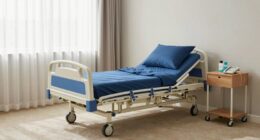Effective treatments for sleep apnea in the United States include weight loss, nasal decongestants, CPAP machines, BiPAP machines, oral appliances, and tailored solutions. Weight loss can help lessen the severity of sleep apnea, while nasal decongestants assist in breathing by reducing swelling. CPAP and BiPAP machines work to keep the airway open and improve sleep quality. Oral appliances such as MADs reposition the jaw to allow for better airflow. Tailored solutions are available to cater to individual preferences. It is crucial to consult with a doctor for an accurate diagnosis and personalized care. These treatments can significantly improve sleep quality and overall well-being. Additional details regarding each treatment option can be found on our website.
Key Takeaways
- Weight management through diet and exercise improves sleep apnea symptoms.
- Nasal decongestants relieve nasal congestion for easier breathing.
- CPAP and BiPAP machines maintain open airways during sleep.
- Oral appliances like MADs reposition the jaw to aid airflow.
- Consulting a doctor is crucial for accurate diagnosis and personalized treatment plans.
Weight Loss as Treatment
Losing weight greatly alleviates the severity of sleep apnea, particularly in overweight individuals. Excess weight, especially around the neck, can lead to airway blockages during sleep, worsening the symptoms of sleep apnea. Studies have demonstrated that a modest reduction in body weight, even just 10%, can result in significant improvements in sleep apnea.
Lifestyle modifications such as adopting a healthy diet and engaging in regular physical activity are key components in managing sleep apnea through weight loss. By shedding those extra pounds, individuals not only experience relief from sleep apnea but also enhance their overall health while reducing the risk of other obesity-related conditions.
For overweight individuals struggling with sleep apnea, focusing on weight loss can be a fundamental and effective treatment approach. Remember, even small steps towards a healthier weight can lead to notable improvements in sleep quality and overall well-being.
Nasal Decongestants for Relief

When considering relief for nasal congestion, utilizing nasal decongestants can be an effective solution to ease breathing through the nose. Nasal decongestants work by constricting the blood vessels in the nasal passages, which helps reduce swelling and congestion, ultimately making it easier to breathe. These medications are available in various forms such as sprays, drops, or oral medications, offering temporary relief from nasal congestion symptoms often associated with conditions like allergies or sinusitis.
It is important to follow the instructions provided when using nasal decongestants to avoid potential side effects like rebound congestion. Using these medications as directed can help maximize their benefits while minimizing any adverse outcomes. If you're experiencing nasal congestion that affects your ability to breathe comfortably, consulting with a healthcare professional can help determine the most suitable nasal decongestant for your specific needs. Remember, nasal decongestants can provide relief, but it's essential to use them responsibly to ensure best results.
Breathing Strips for Airway Opening
Breathing strips are adhesive nasal strips that help open nasal passages, reducing airflow resistance during breathing. These drug-free strips work by gently lifting the sides of the nose, improving airflow and reducing snoring.
They're commonly used as a non-invasive option to alleviate symptoms of nasal congestion and mild obstructive sleep apnea.
Nasal Strips Benefits
Using nasal strips can greatly enhance nighttime breathing by opening up the airway for improved airflow. These adhesive bandages are designed to reduce nasal congestion by gently lifting the sides of the nose, promoting easier breathing.
They offer a drug-free and non-invasive solution for temporary relief from conditions like allergies or a deviated septum. Studies have shown that nasal strips not only reduce snoring but also enhance sleep quality by keeping nasal passages open, leading to better oxygen intake.
Widely available over the counter, nasal strips are a cost-effective option for individuals seeking to alleviate nighttime nasal congestion and improve breathing. Consider incorporating nasal strips into your bedtime routine for a more restful and rejuvenating sleep experience.
Proper Application Technique
After experiencing the benefits of nasal strips for improved nighttime breathing, mastering the proper application technique for breathing strips is essential to ensure the best airway opening during sleep.
Breathing strips, also known as adhesive nasal strips, work by physically pulling open the nostrils, reducing nasal resistance, and promoting better airflow. To apply them correctly, start by cleaning and drying the skin on your nose bridge. Gently press the strip onto the bridge, ensuring a secure fit for the best results.
These strips are convenient and non-invasive, making them a great addition to other treatments for sleep apnea. By following the proper application technique, you can enhance airway function and enjoy improved breathing during sleep.
CPAP Machines for Airway Support
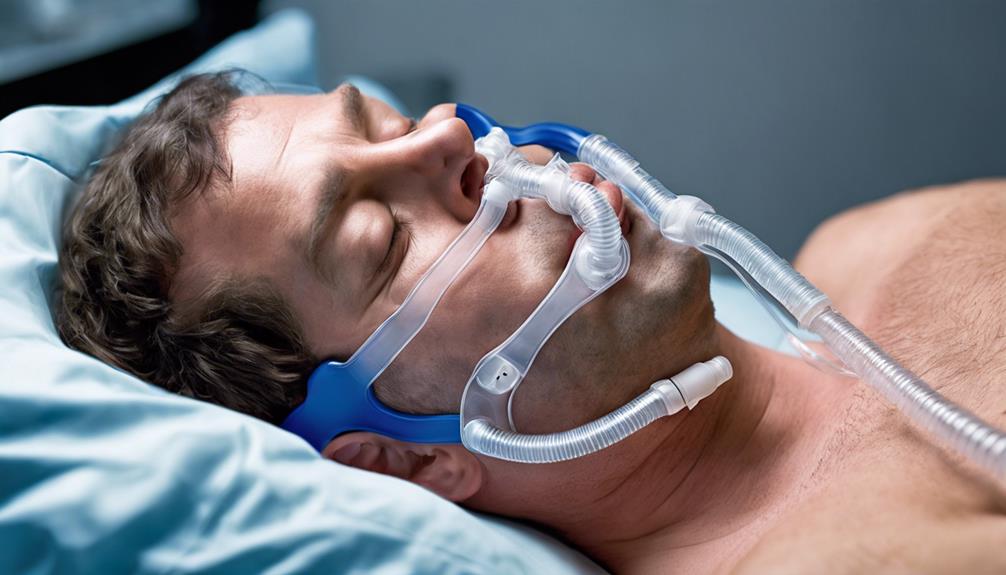
When managing sleep apnea, one effective option for airway support involves using CPAP machines. CPAP, which stands for Continuous Positive Airway Pressure, is a positive airway pressure machine commonly used to treat obstructive sleep apnea. These machines work by delivering a continuous stream of air pressure through a mask worn over the nose or nose and mouth, keeping the airway open during sleep. CPAP machines are considered the most common and effective treatment for obstructive sleep apnea.
Using a CPAP machine can bring various benefits such as reducing snoring, improving sleep quality, and alleviating symptoms like daytime fatigue. There are different CPAP mask options available to suit individual comfort and preference, ensuring a more personalized experience. Regular use of CPAP machines is vital, as it can significantly decrease the risk of complications associated with untreated sleep apnea.
It's important to work with healthcare providers to find the right CPAP machine and mask that best suit your needs for effective airway support during sleep.
BiPAP Machines for Pressure Adjustment
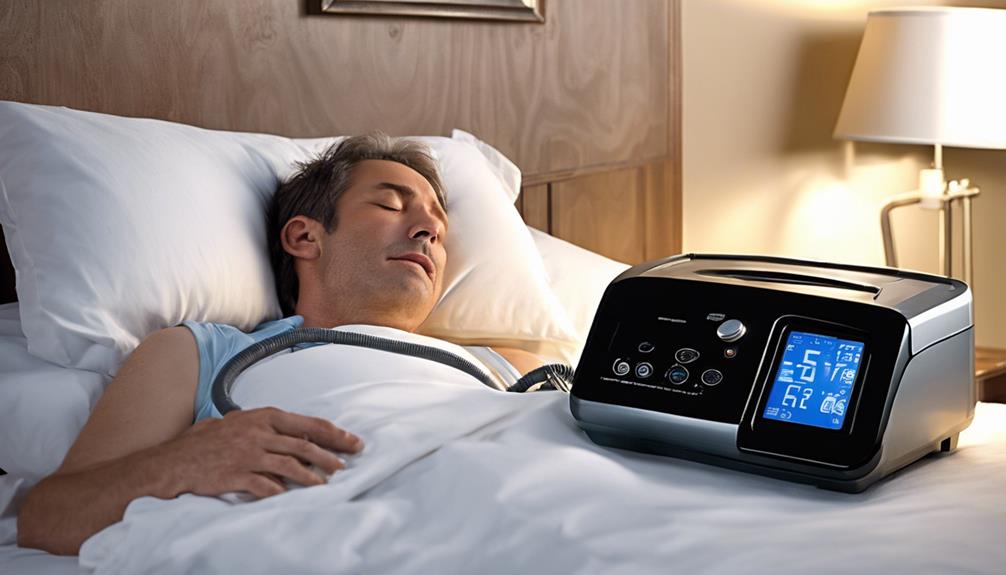
BiPAP machines offer variable pressure adjustments, which can be beneficial for individuals struggling with CPAP therapy. These machines provide higher pressure during inhalation and lower pressure during exhalation, making breathing more comfortable.
BiPAP therapy might be recommended for those with certain medical conditions or when CPAP therapy is ineffective.
Bipap Pressure Settings
Adjusting the pressure settings on BiPAP machines allows for personalized respiratory support tailored to individual needs and comfort levels during sleep. When considering Bipap pressure settings, it's important to:
- Understand the two levels of air pressure: IPAP for inhalation and EPAP for exhalation.
- Consult with a healthcare provider to determine the appropriate pressure settings based on specific respiratory requirements.
- Recognize that BiPAP machines offer a more natural breathing experience for individuals who struggle with exhaling against constant pressure.
Bipap Therapy Effectiveness
Could BiPAP therapy effectively enhance respiratory support for individuals with specific breathing challenges?
BiPAP therapy, or bilevel positive airway pressure, offers different pressure levels for inhalation and exhalation, making it beneficial for those struggling with exhaling against constant CPAP pressure. This treatment is often prescribed for conditions like COPD, obesity hypoventilation syndrome, and central sleep apnea.
The adjustable pressure settings of BiPAP machines cater to patients requiring varying levels of breathing support, potentially improving comfort and compliance compared to CPAP therapy. Individuals with COPD, in particular, may find BiPAP therapy highly effective due to its customizable pressure adjustments.
If you have specific breathing challenges, consulting a healthcare provider about BiPAP therapy and its potential benefits, especially in managing COPD, could be advantageous.
ASV and VPAP Machine Alternatives
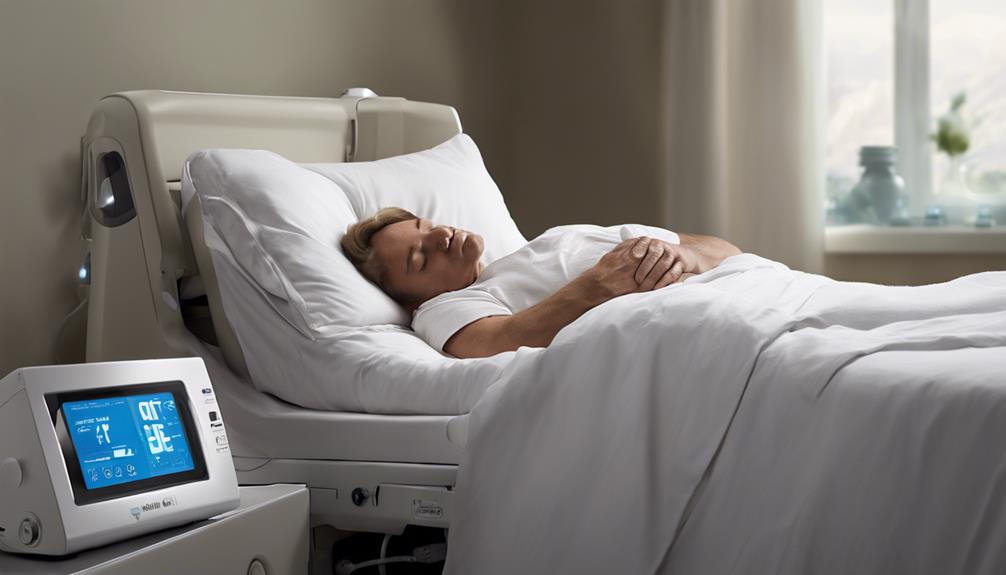
When exploring alternatives to ASV and VPAP machines, individuals may find customizable options that better suit their specific respiratory needs. Here are some alternative treatments to explore:
- Adaptive Flow Generators: These devices adjust airflow based on breathing patterns, similar to ASV machines, but offer a different mechanism of action that may be more suitable for some individuals with central sleep apnea.
- Bilevel PAP Machines: Bilevel Positive Airway Pressure machines provide varying pressure levels during inhalation and exhalation, akin to VPAP machines. They can be adjusted to address specific respiratory requirements effectively.
- Nasal EPAP Devices: These devices use expiratory positive airway pressure to keep the airways open during sleep. While different from traditional ASV and VPAP machines, they can be a valuable alternative for individuals seeking non-invasive treatment options.
These alternatives offer diverse approaches to managing sleep apnea and can be tailored to meet individual needs effectively.
Oral Appliances (MADs) for Comfort
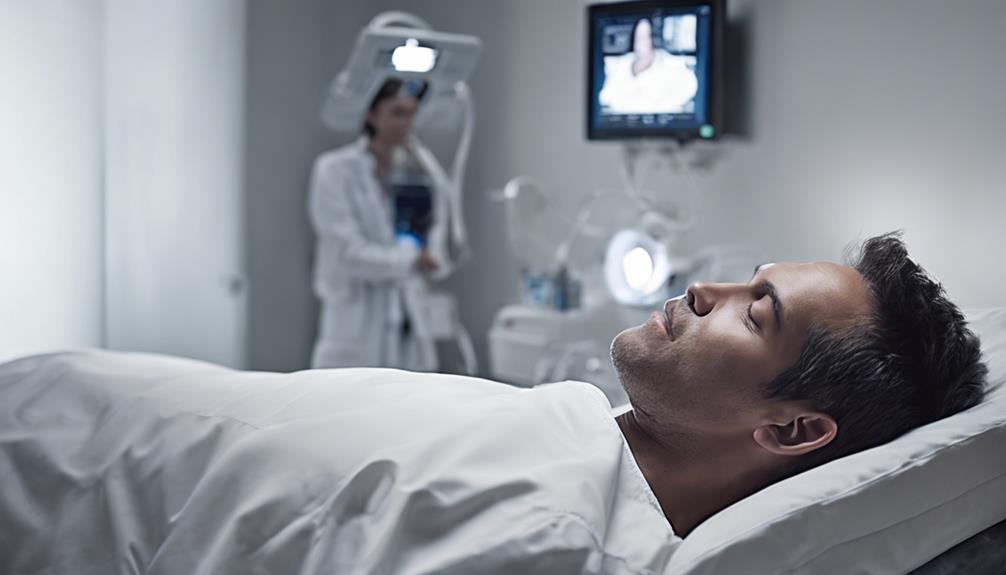
When evaluating oral appliances (MADs) for sleep apnea, it's crucial to prioritize comfort and effectiveness. These custom-fit devices offer a comfortable solution for maintaining an open airway during sleep, delivering relief from obstructive sleep apnea.
With adjustable options available, individuals can customize the fit for optimal comfort and enhanced management of sleep apnea symptoms.
MADs for Sleep
Oral appliances known as MADs provide a comfortable and effective non-invasive treatment option for managing sleep apnea by repositioning the jaw or tongue to keep the airway open. These custom-fitted devices offer a tailored solution for individuals who find CPAP machines uncomfortable or unsuitable. When considering MADs for sleep apnea treatment, it's crucial to bear in mind the following key points:
- MADs are adjustable for maximum comfort during sleep.
- Dentists specially design and fit these oral appliances to guarantee proper alignment.
- Custom-designed MADs offer a more precise solution compared to over-the-counter options for managing mild to moderate cases of sleep apnea.
Comfort and Effectiveness
Utilizing custom-designed MADs tailored by dentists guarantees both comfort and effectiveness in managing sleep apnea by repositioning the jaw or tongue to maintain an open airway. These oral appliances provide a personalized fit that ensures maximum comfort during sleep, making them a preferred choice for individuals with mild to moderate sleep apnea.
By adjusting the position of the jaw, these devices help prevent airway collapse and promote uninterrupted breathing throughout the night. Unlike over-the-counter options, custom-designed MADs offer superior comfort and effectiveness for long-term use.
Regular consultations with a dentist are essential to monitor the fit and make any necessary adjustments to optimize the device's performance. Choosing custom-designed oral appliances with jaw repositioning capabilities is a reliable solution for managing sleep apnea comfortably and effectively.
Custom Fit Options
For individuals seeking maximum comfort in managing sleep apnea, custom-fitted oral appliances such as MADs offer a personalized solution by repositioning the jaw or tongue to maintain an open airway.
When considering custom-fit options for sleep apnea treatment, it's crucial to understand the benefits of oral appliances:
- Personalized Fit: Custom-fitted oral appliances guarantee a comfortable and secure fit tailored to your mouth's unique shape.
- Improved Comfort: MADs are designed to be comfortable to wear throughout the night, promoting better adherence to treatment.
- Effective Airway Support: By repositioning the lower jaw and tongue, these devices help prevent airway blockage during sleep, reducing symptoms of sleep apnea.
Tailored Solutions for Specific Needs

Tailored solutions cater to individual needs and preferences for effective sleep apnea treatment. When it comes to managing obstructive sleep apnea, oral appliances offer customized solutions that can make a significant difference. These devices, such as mandibular repositioning mouthpieces and tongue-retaining devices, work by keeping the throat open during sleep, thereby preventing airway blockages. Unlike CPAP machines, oral appliances provide a personalized approach that may be more comfortable for some individuals. Dentists often fit these devices to guarantee proper alignment and effectiveness in treating sleep apnea.
For those who struggle with CPAP intolerance or prefer non-invasive options, oral appliances present a viable alternative. By choosing tailored oral appliance options, you can address your specific needs and preferences, making the treatment of sleep apnea more comfortable and effective. Consulting with a healthcare provider can help you determine if oral appliances are the right choice for you based on your individual circumstances.
Consulting a Doctor for Guidance

When considering treatment options for sleep apnea, consulting a doctor for guidance is essential in accurately diagnosing the condition and determining the most effective course of action based on individual needs and preferences. Healthcare providers play an important role in crafting personalized treatment plans that cater to specific requirements.
Key aspects of consulting a doctor for sleep apnea include:
- Discussion of Symptoms: A thorough conversation about symptoms, sleep patterns, and medical history aids in proper diagnosis.
- Recommendation for Sleep Studies: Doctors may suggest sleep studies like polysomnography to evaluate the severity of sleep apnea accurately.
- Access to Treatment Options: Seeking medical advice provides access to effective treatments such as CPAP machines, oral appliances, surgery, or lifestyle modifications tailored to the patient's needs.
Effective Management Approaches
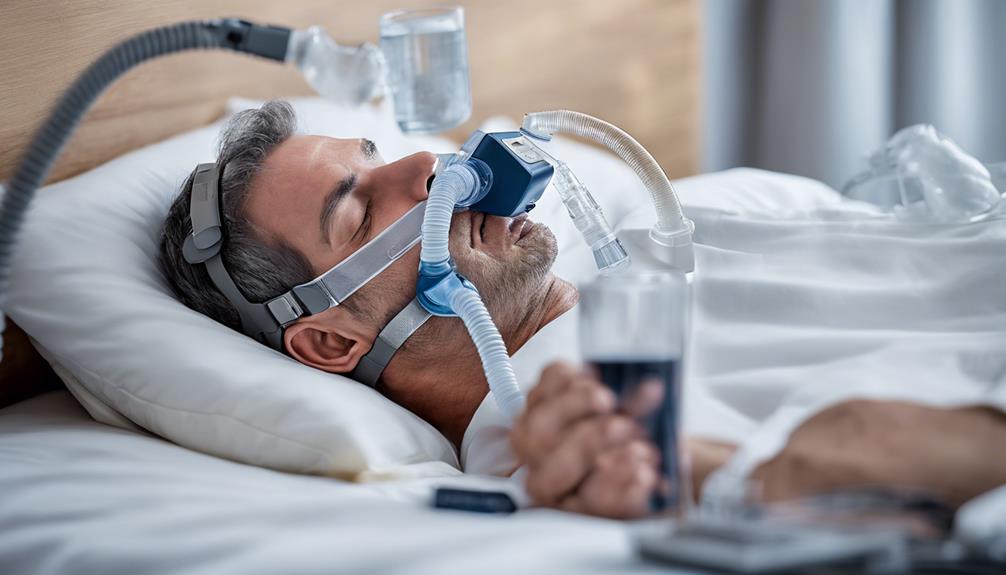
To effectively manage sleep apnea, utilizing various treatment approaches tailored to individual needs and preferences is essential. Regular use of a CPAP machine is highly effective in managing obstructive sleep apnea by keeping the airways open during sleep.
Oral appliances, such as mandibular repositioning mouthpieces and tongue retaining devices, offer a non-invasive treatment option for some individuals with sleep apnea. These devices can help maintain proper airway alignment and reduce breathing disruptions during sleep.
Additionally, incorporating lifestyle changes can complement treatment strategies for managing sleep apnea effectively. Weight loss, avoiding alcohol and sedatives, quitting smoking, and adjusting sleep positions can all contribute to improved symptoms.
It's important to consult healthcare professionals to determine the most suitable management approach based on individual circumstances. By combining CPAP therapy, oral appliances, and lifestyle modifications, individuals can take proactive steps towards effectively managing sleep apnea and improving their overall quality of sleep.
Frequently Asked Questions
What Is the Most Effective Treatment for Sleep Apnea?
When considering the most effective treatment for sleep apnea, we find that Continuous Positive Airway Pressure (CPAP) therapy stands out.
This treatment involves using a CPAP machine to deliver a constant air pressure that helps keep the airway open during sleep, reducing apnea episodes and improving oxygen levels.
Studies have consistently shown that proper and consistent use of CPAP therapy can markedly decrease daytime sleepiness, enhance quality of life, and lower the risk of associated health issues.
What Is the Newest Treatment for Sleep Apnea?
The newest treatment for sleep apnea involves a surgically implanted device that stimulates the hypoglossal nerve to help keep airways open during sleep. This innovative approach targets specific nerves in the throat to prevent airway collapse in individuals with obstructive sleep apnea.
What Is the Permanent Solution for Sleep Apnea?
When looking for a permanent solution for sleep apnea, consider upper airway stimulation (UAS) implantation.
This surgical option involves implanting a device to stimulate the hypoglossal nerve, keeping airways open during sleep.
UAS has shown effectiveness for patients intolerant to CPAP therapy or unresponsive to other treatments.
Consultation with a sleep specialist or ENT surgeon can help determine if UAS is the right fit for treating your sleep apnea.
What Is the Best Alternative to Cpap?
When searching for an alternative to CPAP, oral appliances like mandibular advancement devices (MADs) stand out. These custom-fit devices reposition the jaw and tongue, keeping the airway open during sleep.
They're akin to CPAP but offer more comfort and convenience for many. Choosing an oral appliance can be a game-changer due to its ease of use and portability.
It's a viable option for those who struggle with CPAP therapy.
Conclusion
Ultimately, identifying the most effective treatment for sleep apnea is essential for enhancing quality of life. By exploring various options such as weight loss, nasal decongestants, CPAP machines, and oral appliances, individuals can find relief and support for their condition. Ultimately, identifying the most effective treatment for sleep apnea is essential for enhancing quality of life. By exploring various options such as weight loss, nasal decongestants, CPAP machines, and oral appliances, individuals can find relief and support for their condition. Additionally, staying informed about new sleep apnea treatments can open the door to innovative solutions that may be more convenient or effective. Advances in technology and ongoing research continue to expand the range of options available, offering hope for improved outcomes and greater comfort.
Seeking guidance from a doctor for personalized advice is key to successful management. Remember, with the right approach and support, managing sleep apnea can lead to better sleep and overall health.
Stay informed, seek help, and rest easy knowing there are solutions available.






